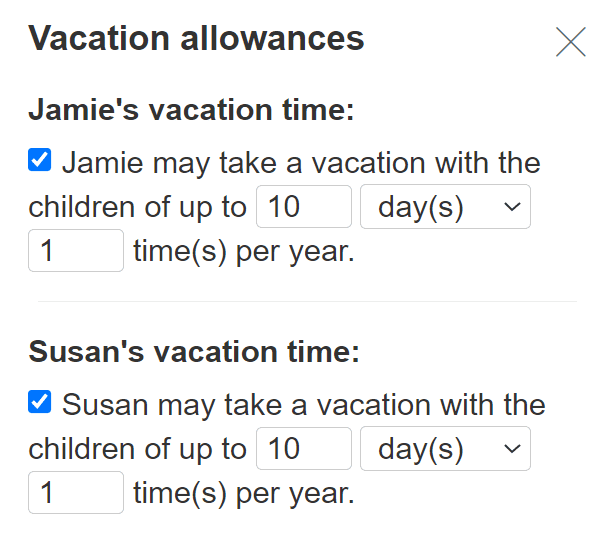Nova Scotia Parenting Time Schedules
In Nova Scotia, it is the child's right to have "safe and reasonable" contact with each of their parents.
A parenting time schedule details when the child will be with each parent. Your parenting plan must include a written schedule. You can add a visual representation for clarity.
Types of parenting time
There are a few different types of parenting time.
- Primary parenting time: One parent has more than 60 percent of parenting time. The other parent has what's called access (regular visits).
- Shared parenting time: Each parent has the child for at least 40 percent of the year.
- Split parenting time: Each parent has at least one of the children for more than 60 percent of the year. (This is rare.)
The type of parenting time determines which child support formula applies.
There's also interaction time, which is time spent indirectly with the child (e.g., talking to the child on the phone, going to their sporting events). Interaction time is generally not covered in a schedule, but you can address it in your parenting plan.
Parenting time schedules
Your schedule can be very specific (like the examples below) or general (e.g., "The children will spend three nights per week with Mom."). Specificity helps prevent conflict or confusion.
When choosing a schedule, consider your child's needs, maturity and age. The following suggestions are age-based. If there's a large gap in your children's ages, choose a schedule recommended for a child in that gap.
The following are some of the most popular schedule options.
Shared parenting time schedule options
With the alternating weeks (50/50) schedule (also called the week-on-week-off schedule) the child spends seven days with one parent, then switches to the other parent's home for seven days.
Spending extended periods at each parent's home suits teenagers who want few interruptions in their school and social life.
 You can customize this with Custody X Change.
You can customize this with Custody X Change.
The 4-3 (60/40) schedule has your child live with one parent four days out of the week and with the other three days out of the week.
This schedule suits kids who are at the adolescent stage, where they are becoming more independent but still need regular time with each parent.
 You can customize this with Custody X Change.
You can customize this with Custody X Change.
The 2-2-3 (50/50) schedule has the child stay with one parent for two days, transition to the other parent's home for two days, then spend three days with the first parent. The start parent switches each week.
This works well for younger children who need regular contact with their parents to maintain familiarity and comfort.
 You can customize this with Custody X Change.
You can customize this with Custody X Change.
Primary parenting time schedule options
When explaining a primary parenting time schedule in writing, parents often just describe the access parent's time, then say that the parent providing the child's primary residence will have all other time. But you may specify both parents' time, especially in a visual version of your schedule.
The alternating weekends (80/20) schedule places the child with the access parent every other weekend.
This schedule could work for older children who can adjust to not seeing the access parent often. Consider adding an overnight visit every other week to give the access parent more time.
 You can customize this with Custody X Change.
You can customize this with Custody X Change.
Younger children may adjust better if they can visit both parents every week.
The 5-2 (70/30) schedule places the child with one parent for five days out of the week and with the access parent for two days out of the week.
 You can customize this with Custody X Change.
You can customize this with Custody X Change.
If you have an infant, they should have frequent contact with both parents throughout the week.
You can even add an overnight so your baby can adjust to staying overnight with the access parent. Make sure both parents follow similar routines because infants need familiarity.
 You can customize this with Custody X Change.
You can customize this with Custody X Change.
Adding third-party time
If you allow anyone other than a parent to have regular visits (called contact), you can include third-party time in your schedule. If you're a Custody X Change user, this will also give you more accurate parenting time totals.
 You can customize this with Custody X Change.
You can customize this with Custody X Change.
Holidays and vacations
Plan for holidays in your schedule so you don't have to stress over parenting time on these occasions.
Many parents choose to alternate holidays every year, granting one parent a holiday in even-numbered years, and the other parent the same holiday in odd-numbered years.

You can put vacation allowances in your parenting plan, allotting each parent a certain amount of vacation time to exercise with the child in a year. You may want to stipulate that a parent must give adequate notice.

The easiest way to make a schedule
If you're like most parents, creating a parenting time schedule will feel daunting. How do you address holidays, school breaks and birthdays while ensuring the schedule will work in the years to come?
The Custody X Change app makes it easy. First, click and drag in your colour-coded calendar.
Try this with Custody X Change.
Then watch as your choices automatically apply to future years and a full description appears in your Custody X Change parenting plan.
 You can customize this with Custody X Change.
You can customize this with Custody X Change.
The combination of a visual and written schedule means your family will have no problem knowing who has the child when. Take advantage of Custody X Change to make your schedule as clear and thorough as can be.
